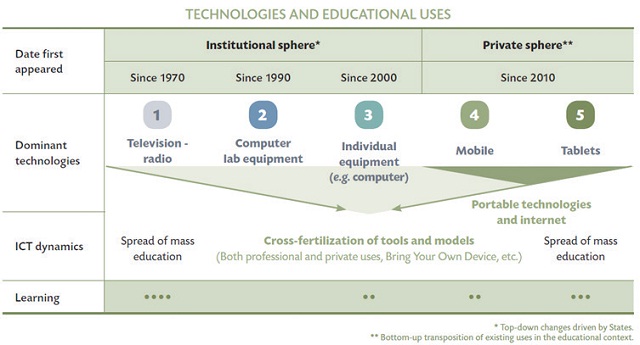
Digital Services for Education in Africa
The arrival of personal computers in the 2000s facilitated the individualisation of school ICT. The US One Laptop per Child project, launched in several African countries in 2005, aimed to equip schools with laptops at low cost.
Nearly 2 million teachers and pupils are involved in this programme across the world. More than 2.4 million computers (at a cost of around $200 including an open teaching platform) have been delivered. Evaluations show that the use of portable or fixed computers in the classroom has only a limited effect on pupils’ academic performance. But it may have a positive impact on certain cognitive abilities if pupils can use their computers at home in the evening.
Contents and uses
Since 2010 the large-scale diffusion of mobile communications technology has transformed practices with easier access to educational resources in and outside school. The arrival of low-cost, low-consumption smartphones and tablets allows ICT in education to gradually move out of the school environment.
There has been a shift from a tool-based approach to one that’s centred on content and use. These mobile tools, particularly tablets, offer important opportunities to tackle the lack of books and textbooks. The distribution of Kindle-style readers to 600,000 children in nine African countries has seen a considerable impact on reading and on pupils’ results in educational tests.
The sending of text messaging containing short lessons, multiple choice tests or audio recordings have also been shown to have an important effect on teachers. This is also true of MOOCs (massive open online courses) adapted to African countries’ needs and capacities.
The cross-fertilisation of teaching models and tools has broadened the potential of information and communication technology in education. Some technologies, perceived as outdated, are undergoing a partial revival thanks to the combination of media that can be used in any single project. For example radio and television programmes are inexpensive and attract a considerable audience. Combined with Internet and mobile phones they provide promising educational results.
The BBC’s Janala English-instruction programme for the people of Bangladesh is a good example of cooperation between very diverse actors.
What are the conditions for success?
Most African countries are showing an interest in technology in education. But a range of conditions must be satisfied to ensure that they are deployed efficiently within the educational landscape. This includes: Responding to technical and economic constraints, responding to users’ needs and strengthening their capacities, finding sustainable funding models, facilitating effective multi-stakeholder collaboration.
Although the time for innovation and experiment will never end, now is the moment to put systems and strategies in place for moving to the next level, particularly by setting up stakeholder coalitions. ICT will not resolve all of Africa’s education problems. But it can help to fundamentally change the current paradigm of skills development systems.
****
Rohen d’Aiglepierre, is a PhD, Human Capital Reseacher, AFD (Agence française de développement), Amélie Aubert is Project Leader (Education) at AFD, and Pierre-Jean Loiret is responsible for Numeric Education at Agence universitaire de la francophonie (AUF). This article was co-authored with Erwan Lequentrec (Orange Labs) and Francesc Pedró (Unesco). The text is based on “Digital Services for Education in Africa”, written by David Ménascé and Flore Clément.
 The Independent Uganda: You get the Truth we Pay the Price
The Independent Uganda: You get the Truth we Pay the Price



